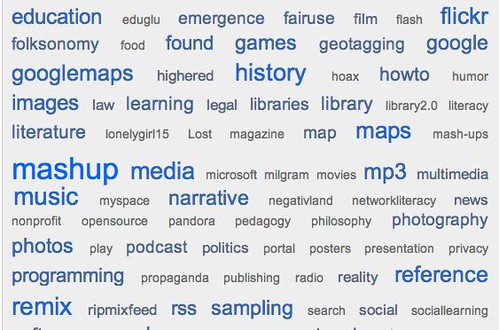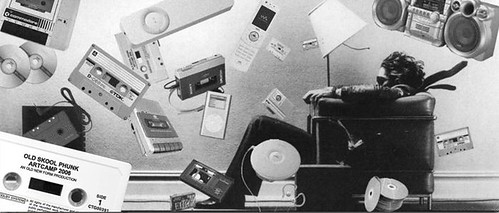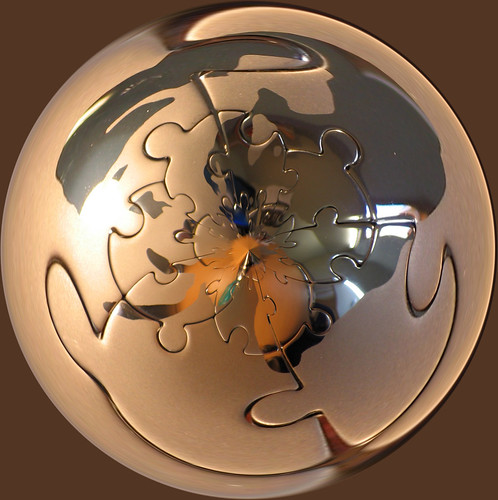Time is short, and the mindqueue of unposted blog entries continues to mount.
On the weekend, my music and martini guru Bill played me a lot of great stuff through his audiophile hi-fi that makes me drool every time I’m near it. Ecstatic and awash in sound, I made him play and re-play Robert Wyatt’s “Soup Song” a few times — what an exhilarating rollicking thumper it is… So I’ll mix this post up like a pot of soup, a little of this, a little of that, with Wyatt’s song serving as a soundtrack (you can hear it here if you scroll to 14 minutes in) and thematic broth…
There’s a mushroom on my eyelid
There’s a carrot down my back
I can see in the distance
A vast quantity of beans
* Kathleen Fitzpatrick’s Writing Machines course, an exploration of “the relationship between contemporary literature and computer technologies, focusing on the ways that new technologies of writing have affected the development and dissemination of narrative.” Great looking stuff, and nifty use of Drupal. Via the mighty Infocult.
To you I’m just a flavour
To make your soup taste nice
Oh my god here come the onions
And, I don’t believe it, at least a pound of rice
* A nifty 33 minute Introduction to Mashup Development, part of Mashup University. Via oook the magnificent.
* And speaking of mashups, Scott the sagacious points me to EducationSearch.net that “provides personalized searches to save for future reference. Utilizes Flickr, Google Maps and YouTube.”
There was a time when bacon sandwiches
Were everyone’s favourite snack
I’m delicious when I’m crunchy
Even when I’m almost black
* Jim Grrrrrrroom alerts us to the release of WordPress MU 1.0 and bbpress: “this is a great day for the open source possibilities for education. I am all the more certain (and that is now very, very, very certain:) these days that such applications, loosely bound, are the wave of the future for instructional technology.” Man oh man, do I hope he’s right. Thanks to my wonderful office techies, I have sandbox versions of both these applications installed on demo boxes, let me know if you want to play.
So why you make a soup with me
I just can’t understand
It seems so bloody tasteless
Not to mention underhand
* Electric Alan the Eclectic walks the talk with a typically informative and inventive presentation: “I decided to build was not a presentation in one file, movie, podcast, but to spread it all over the web… and for each web tool discussed, I tried to use it as the platform of presentation.” He is kind enough to provide a wikified index.
Now there’s no hope of getting out of here
I can feel I’m going soft
Dirty waters soak my fibres
The whole saucepan’s getting hot
* A few weeks back I posted on the Harper’s roundtable on educational gaming, with much of the discussion speculating on an immersive environment employing literary texts as historical and cultural riddles. Jumping Jeff Miller (gotta get bloggin’ if you want a cooler nickname dude) emailed me a link to this story on a Richard III-based game in development: ‘one of the more unique elements of “Arden” is that the game will be seeded with Shakespearean texts, many of which will be the most valuable treasure players can find. …”If you collect the ‘To be or not be’ speech and then take it to a lore master or to a skilled bard, he can then apply the magic to your broad sword or you (could) utilize the magic in a battle situation to give you this massive (advantage),” Castronova explained. “So there (will be) this intensive competition to get the best speeches of Shakespeare in your play book.’
So I may as well resign myself
Make friends with a few peas
But I just, I can’t help hoping
a tummy ache will bring you to your knees
You know, I’ve never been much of a soup cook, better on the barbeque…
Bring you to your knees…






